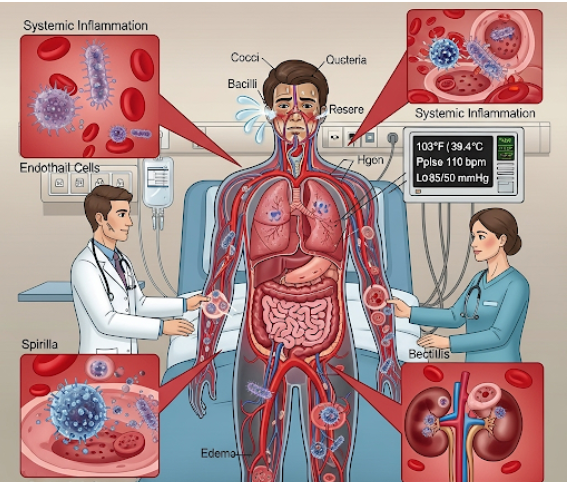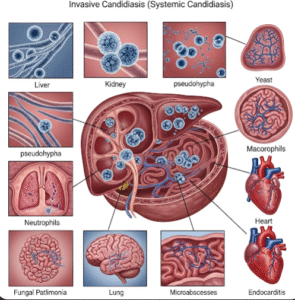Overview
Systemic bacteremia is a serious medical condition where bacteria enter the bloodstream, causing a body-wide infection. It can progress rapidly and lead to severe complications such as sepsis, septic shock, or multi-organ failure if not treated promptly. This condition is a medical emergency and requires immediate hospital care.
What is Systemic Bacteremia?
Systemic bacteremia occurs when bacteria from a localized infection—such as pneumonia, urinary tract infection, or skin wound—gain access to the bloodstream and spread throughout the body. The presence of bacteria in the blood triggers an immune response that can damage tissues and organs. It differs from simple bacteremia by the fact that it produces systemic symptoms, often involving multiple organ systems.
Symptoms
- High fever or chills
- Rapid heart rate (tachycardia)
- Low blood pressure (hypotension)
- Confusion or altered mental status
- Shortness of breath
- Fatigue and weakness
- Nausea, vomiting, or diarrhea
- Skin rash or discoloration in severe cases
Causes
- Complications of localized infections (e.g., lung, urinary tract, abdominal)
- Infected medical devices (catheters, IV lines)
- Post-surgical wound infections
- Immunosuppressive conditions (e.g., HIV, chemotherapy)
- Poorly controlled diabetes
- Intravenous drug use
Risk Factors
- Weakened immune system
- Recent major surgery or hospitalization
- Use of indwelling medical devices
- Chronic illnesses such as kidney disease or liver disease
- Advanced age
- Delayed or inappropriate treatment of infections
Complications
- Sepsis and septic shock
- Acute respiratory distress syndrome (ARDS)
- Multi-organ failure
- Disseminated intravascular coagulation (DIC)
- Death if untreated or treatment is delayed
Prevention
- Early detection and treatment of local infections
- Proper sterilization of medical equipment
- Good wound care and hygiene
- Safe handling and insertion of IV lines and catheters
- Vaccinations against bacteria such as pneumococcus and meningococcus
- Regular health check-ups for high-risk patients
Treatment Options in Korea
In Korea, systemic bacteremia is treated aggressively in specialized hospitals and infectious disease centers. Management usually includes:
- Hospitalization in ICU for severe cases
- Intravenous broad-spectrum antibiotics (adjusted based on blood culture results)
- Fluid therapy to maintain blood pressure and hydration
- Vasopressors in cases of septic shock
- Removal or replacement of infected medical devices
- Oxygen therapy or mechanical ventilation if respiratory distress develops
- Advanced diagnostic tools such as PCR-based pathogen identification for faster and more accurate treatment
Korean healthcare facilities are equipped with modern microbiology labs, critical care units, and rapid antibiotic susceptibility testing, which help improve survival rates for patients with systemic bacteremia.













